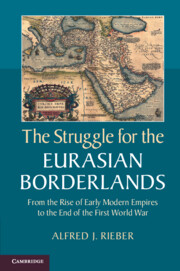 The Struggle for the Eurasian Borderlands
The Struggle for the Eurasian Borderlands Published online by Cambridge University Press: 05 June 2014
If the struggle over the borderlands profoundly affected state-building in the multicultural societies of Eurasia, the reverse was also true. The two processes interacted with one another not only in shaping imperial ideologies, but also in constructing political and socioeconomic institutions. Three key elements in the evolving structures of empire were the army, the bureaucracy, and the ruling elites. This chapter deals with the ways in which these institutions and groups reflected the particular needs of a multicultural state in expanding and defending its military frontiers and imposing order in the borderlands.
The exercise of power in the multicultural states of Eurasia combined in different proportions elements of what Max Weber identified as charismatic, patriarchal, and bureaucratic forms of authority. As he noted, “the majority of all great continental empires had a fairly strong patrimonial character until and even after the beginning of modern times.” But pure patriarchalism probably never existed. In its most arbitrary forms it gradually diminished without entirely disappearing under the increasing need of the ruler for a more reliable system of raising revenue and a greater functional specialization in administration. In an imperial, multicultural system the personal authority of the ruler depended heavily on his ability to project charisma through myths, symbols, rituals, and ceremonies of power that had meaning for peoples of different cultures. But charisma, as Weber and others also remind us, is unstable.
To save this book to your Kindle, first ensure no-reply@cambridge.org is added to your Approved Personal Document E-mail List under your Personal Document Settings on the Manage Your Content and Devices page of your Amazon account. Then enter the ‘name’ part of your Kindle email address below. Find out more about saving to your Kindle.
Note you can select to save to either the @free.kindle.com or @kindle.com variations. ‘@free.kindle.com’ emails are free but can only be saved to your device when it is connected to wi-fi. ‘@kindle.com’ emails can be delivered even when you are not connected to wi-fi, but note that service fees apply.
Find out more about the Kindle Personal Document Service.
To save content items to your account, please confirm that you agree to abide by our usage policies. If this is the first time you use this feature, you will be asked to authorise Cambridge Core to connect with your account. Find out more about saving content to Dropbox.
To save content items to your account, please confirm that you agree to abide by our usage policies. If this is the first time you use this feature, you will be asked to authorise Cambridge Core to connect with your account. Find out more about saving content to Google Drive.